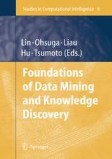Search
Search Results
-
A formalization of the Protagoras court paradox in a temporal logic of epistemic and normative reasons
We combine linear temporal logic (with both past and future modalities) with a deontic version of justification logic to provide a framework for...
-
Logic program proportions
The purpose of this paper is to present a fresh idea on how symbolic learning might be realized via analogical reasoning. For this, we introduce...
-
Justification of recommender systems results: a service-based approach
With the increasing demand for predictable and accountable Artificial Intelligence, the ability to explain or justify recommender systems results by...

-
Computational thinking and repetition patterns in early childhood education: Longitudinal analysis of representation and justification
This paper provides a longitudinal analysis of the understanding of repetition patterns by 24 Spanish children ages 3, 4 and 5, through...

-
Justification and Hypothesis Selection in Data Mining
Data mining is an instance of the inductive methodology. Many philosophical considerations for induction can also be carried out for data mining. In...
-
How to justify a backing’s eligibility for a warrant: the justification of a legal interpretation in a hard case
The Toulmin model has been proved useful in law and argumentation theory. This model describes the basic process in justifying a claim, which...

-
Defeasible Justification Using the KLM Framework
The Kraus, Lehmann and Magidor (KLM) framework is an extension of Propositional Logic (PL) that can perform defeasible reasoning. The results of...
-
Logic-based cognitive planning for conversational agents
This paper presents a novel approach to cognitive planning based on an NP-complete logic of explicit and implicit belief whose satisfiability...

-
Large-Scale Commonsense Knowledge for Default Logic Reasoning
Commonsense reasoning (CSR) is the ability to reason about everyday situations. In artificial intelligence systems, such reasoning requires extensive...

-
SCL(EQ): SCL for First-Order Logic with Equality
We propose a new calculus SCL(EQ) for first-order logic with equality that only learns non-redundant clauses. Following the idea of CDCL (Conflict...

-
Modal and Justification Logics for Multi-agent Systems (Invited Talk)
Epistemic modal logic is an important tool in the area of distributed and multi-agent systems.
-
Logic Separation: Discrete Modelling of Pattern Recognition
AbstractHerein, a historical analytical survey of work of “Discrete Modelling of Pattern Recognition” (DM-Lab) research group in Armenia is...

-
Zeroing Neural Network Based on Neutrosophic Logic for Calculating Minimal-Norm Least-Squares Solutions to Time-Varying Linear Systems
This paper presents a dynamic model based on neutrosophic numbers and a neutrosophic logic engine. The introduced neutrosophic logic/fuzzy adaptive...

-
Investigating the Impact of Backward Strategy Learning in a Logic Tutor: Aiding Subgoal Learning Towards Improved Problem Solving
Learning to derive subgoals reduces the gap between experts and students and makes students prepared for future problem solving. Researchers have...

-
Non-distributive Description Logic
We define LE- \(\mathcal {ALC}\) , a generalization of...
-
Logic-Based Explainable and Incremental Machine Learning
Mainstream machine learning methods lack interpretability, explainability, incrementality, and data-economy. We propose using logic programming to...
-
Logic Aggregators and Their Implementations
In this paper we present necessary properties of logic aggregators and compare their major implementations. If decision making includes the...
-
Stable Normative Explanations: From Argumentation to Deontic Logic
This paper reconstructs in the context of formal argumentation the notion of stable explanation developed elsewhere in Defeasible Logic. With this...
-
Clones, closed categories, and combinatory logic
We explain how to recast the semantics of the simply-typed \(\uplambda \)...
-
Combining Logic Programming and Imperative Programming in LPS
Logic programs and imperative programs employ different notions of computing. Logic programs compute by proving that a goal is a logical consequence...
